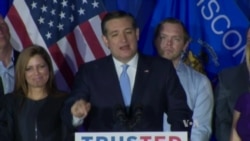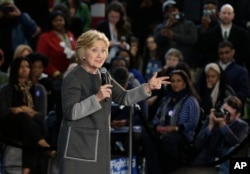Judging by prevote polls, Texas Senator Ted Cruz and Vermont Senator Bernie Sanders beat expectations Tuesday in the Midwestern state of Wisconsin, where they each scored expected wins but with wider margins.
However, political analysts say those overachievements do not mean people should rush to bet on them to win the next states or their party nominations.
"It's been pretty common in this process for the race just to change from state to state. Momentum hasn't always helped," said Craig Gilbert, the Washington bureau chief for the Milwaukee Journal Sentinel.
Sanders spoke of momentum to his supporters Tuesday night, after having won six of the last seven state contests. But despite that success, he still trails far behind former Secretary of State Hillary Clinton in terms of Democratic delegates.
Cruz is closer, but in a similar position behind Republican front-runner Donald Trump.
"I think Wisconsin's impact is that it prolongs the race," Gilbert told VOA. "Had the front-runners won here, it was an opportunity for them to really put their opponents away. It was a difficult state for them, but it was a chance for them to really put a nail in the coffin of the other candidates and they didn't do that."
Instead, Cruz took almost all of Wisconsin's 42 delegates, making it more difficult for Trump to amass a majority of delegates and avoid an open Republican convention where the nominee could be anyone's guess.
'Steal the nomination'
Trump blasted Cruz in a statement after the vote, saying conservative radio hosts and "the entire party apparatus" backed Cruz in a bid to "steal the nomination" from Trump.
WATCH: Video report by Political Correspondent Jim Malone
Gilbert said Wisconsin became the place where a candidate began to consolidate support after the once-large Republican field narrowed, and the support went to Cruz.
"The governor got behind him, conservative activists, conservative media, a lot of Republican politicians lined up behind him in this race partly just because they saw him as a vehicle to stop Trump, and he took advantage of that," Gilbert said.
Because the two parties have different rules when it comes to awarding delegates, Sanders is in a much more difficult situation than Cruz.
Democrats use a proportional system, meaning Sanders has to beat Clinton by wide margins in lots of states to catch up.
For Cruz, more than half of the remaining Republican contests are winner-take-all or winner-take-most, so wins will deliver many delegates.
"That knife-edge change going from being in second to being in first can be huge, and there's a lot of delegates up for stake in some of these states, which then makes it more unpredictable from this perspective," said Hans Noel, an associate professor of government at Georgetown University.
The next Republican primary is not until April 19 in New York, and Noel told VOA there is probably some significance with that break and a narrative that Trump is beatable.
WATCH: Related Wisconsin primary video
He said the Republicans who want to beat Trump have to do extraordinary things and need "the excitement to believe that they can pull it off."
He also said uncertainty in the race works in favor of Cruz.
"As soon as it becomes very clear that Trump is going to have a majority of delegates, as soon as that happens, it's going to be very hard for people not to get used to the idea of Trump as the nominee," Noel said. "And then when the party tries to do whatever maneuvering that they do to stop that at the convention, it's going to be seen as illegitimate."
Trump's statement Tuesday night was the latest in which he suggested the Republican Party was treating him unfairly.
To this point, he has not said he would consider a third-party bid if denied the Republican nomination, but doing so would make it more difficult for a Republican to win the White House in November.
Uncertainty is much harder to find in the Democratic race, where Noel said the math suggests Clinton is going to win.
Sanders has built his campaign on a grassroots movement that heavily features the support of young people.
He has pledged to not drop out of the race before the Democratic convention in July and continues to draw big, passionate crowds to his rallies.
While the Republican candidates have backed off their early pledges to support whoever becomes their nominee, there is little doubt Sanders will throw his support behind Clinton. But that does not mean all of his backers will be happy to do so.
"Sanders has got to be starting to think, what can I do to transition to play a role in the convention, play a role in the party, play a role in a post-primary period where his is not the nominee," Noel said.
He suggested one possible path for Sanders is to look at what the Tea Party movement has successfully done in the Republican Party by putting all of its focus on congressional races.
"If Democrats and Democratic voters who like Sanders wanted to pursue that agenda, that would be a strategy, and he's got this organization now," Noel said. "It's hard to transition that from him to someone that's not him, but you can see that happening, possibly either at his initiative or at the initiative of other people who are involved in the Sanders movement."











